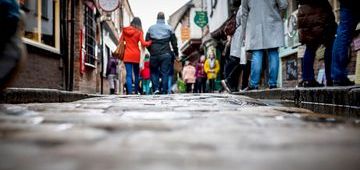This is an important time in the field of gambling harm prevention.
The findings from Public Health England’s much-anticipated gambling related harms evidence review last year confirmed the massive costs to society associated with gambling: £1.27 billion in England alone. With the twice-delayed UK government white paper review of the Gambling Act 2005 expected imminently, the landscape for gambling regulation in the UK is likely to change.
We know that children and young people are a vulnerable group, with an estimated 15,000 young people in Scotland experiencing harm related to gambling at any time. However, they are still routinely exposed to gambling and gambling ads. They are also increasingly exposed to gambling-like mechanics in video games – the overwhelming majority of children and young people game, and they are more likely than older adults to spend money on controversial mechanics like ‘loot boxes’.
Given children and young people’s vulnerability to harm, and their more limited opportunities for influencing policymakers and service providers, it is particularly important to create space for young people across Scotland to have their voices heard. If we are to take the UNCRC principles seriously, we must enable young people to take an active role in conversations about how we can best protect them from gambling harms.
To that end, last year the Health and Social Care Alliance Scotland (the ALLIANCE) commissioned Young Scot and Fast Forward to ask young people in Scotland their views on gambling and gaming. We designed a survey in collaboration with a panel of young people and a panel of experts with lived experience of gambling harms, and it ran from October-December 2021.
We received responses from 545 children and young people ages 11-26 years old, including responses from all 32 local authorities across Scotland.
Key findings:
- A large majority of young people (92%) have played a video game in the last 12 months, with 2 in 5 gamers (40%) playing every day
- Over half of young people (60%) had opened a loot box in a game
- A quarter of young people (24%) have gambled in the last 12 months
- A quarter of young people who gamble (25%) said their gambling had impacted them in some way
- Of those who have someone close to them who gambles, a third (33%) have worried about that person’s gambling
- Young people’s feelings about loot boxes were fairly neutral, with the same proportion saying they ‘don’t like them at all’ as ‘like them a lot’ (9%)
- More than 4 in 5 respondents (84%) think young people should have a say on the laws around gambling and gambling-like game features
We were surprised by some of these findings. One quarter of respondents said their gambling had impacted them, with those impacted less likely to feel in control, and more likely to describe gambling as an addiction. This rate is much higher than the Gambling Commission’s reported 4.4% of young people ‘at-risk’ of harm or experiencing ‘problem gambling. This may be down to people being more likely to take part in our survey if they had been impacted by gambling. It also may be that our respondents experienced relatively mild impacts that might not be captured by the DSM-IV ‘problem gambling’ screen used in the Gambling Commission’s survey.
Similarly, among respondents who have someone close to them who gambles, a third said it had worried them at some point. This means that the gambling of family members or friends is likely a source of concern for many young people. Much of the existing research on the impacts of gambling on affected others focuses on adults – we need to do more to understand children and young people’s worries.
However, we were not surprised that so many young people want more of a say on laws that affect activities they participate in regularly – and we plan to work with them to enable this. All respondents who felt young people should have more say were given an opportunity to note interest and get involved in developing a Youth Commission on Gambling Harms in Scotland.
The amplification of voices with lived experience of gambling harm, through newly-formed networks and forums, has been one of the most timely and exciting developments in this space. However, my understanding from conversations with people working in these networks is that it has been difficult to get young people engaged. In part, this is down to the nature of recovery taking time – by the time someone is in a place to take part in a lived experience network, they may have had a lengthy recovery journey. This means we need to find other ways of hearing from children and young people.
Youth Commissions on other policy issues have been impactful on Scottish Government policy. Therefore, we are hopeful that this piece of research will just be the beginning of a process of giving young people a place at the table.
A full report on this research is now available for download.
If you have any questions or want more information about this piece of research, get in touch with Christina at [email protected]. For more information about the development of a Youth Commission, please contact Georgina Charlton at [email protected].
If you are looking for support around your own or someone else’s gambling, please contact the National Gambling Helpline on 0808 8020 133. The National Gambling Treatment Service is available for free, 24/7, providing support over the phone and on live chat.



